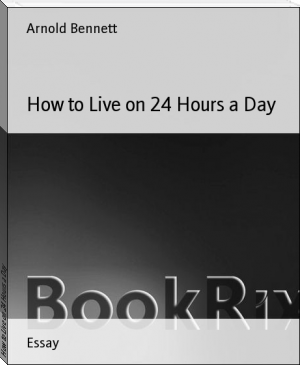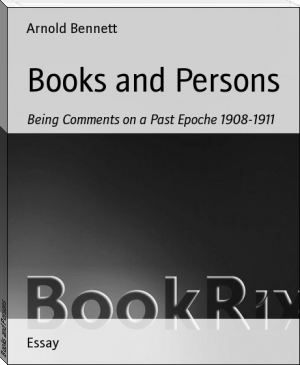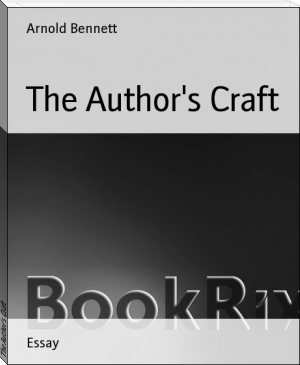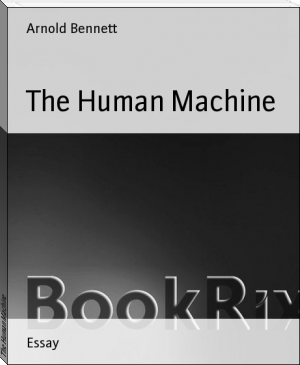How to Live on 24 Hours a Day - Arnold Bennett (pdf ebook reader TXT) 📗

- Author: Arnold Bennett
Book online «How to Live on 24 Hours a Day - Arnold Bennett (pdf ebook reader TXT) 📗». Author Arnold Bennett
What does that matter? That you have a genuine taste for music is proved by the fact that, in order to fill his hall with you and your peers, the conductor is obliged to provide programmes from which bad music is almost entirely excluded (a change from the old Covent Garden days!).
Now surely your inability to perform "The Maiden's Prayer" on a piano need not prevent you from making yourself familiar with the construction of the orchestra to which you listen a couple of nights a week during a couple of months! As things are, you probably think of the orchestra as a heterogeneous mass of instruments producing a confused agreeable mass of sound. You do not listen for details because you have never trained your ears to listen to details.
If you were asked to name the instruments which play the great theme at the beginning of the C minor symphony you could not name them for your life's sake. Yet you admire the C minor symphony. It has thrilled you. It will thrill you again. You have even talked about it, in an expansive mood, to that lady--you know whom I mean. And all you can positively state about the C minor symphony is that Beethoven composed it and that it is a "jolly fine thing."
Now, if you have read, say, Mr. Krehbiel's "How to Listen to Music" (which can be got at any bookseller's for less than the price of a stall at the Alhambra, and which contains photographs of all the orchestral instruments and plans of the arrangement of orchestras) you would next go to a promenade concert with an astonishing intensification of interest in it. Instead of a confused mass, the orchestra would appear to you as what it is--a marvellously balanced organism whose various groups of members each have a different and an indispensable function. You would spy out the instruments, and listen for their respective sounds. You would know the gulf that separates a French horn from an English horn, and you would perceive why a player of the hautboy gets higher wages than a fiddler, though the fiddle is the more difficult instrument. You would _live_ at a promenade concert, whereas previously you had merely existed there in a state of beatific coma, like a baby gazing at a bright object.
The foundations of a genuine, systematic knowledge of music might be laid. You might specialise your inquiries either on a particular form of music (such as the symphony), or on the works of a particular composer. At the end of a year of forty-eight weeks of three brief evenings each, combined with a study of programmes and attendances at concerts chosen out of your increasing knowledge, you would really know something about music, even though you were as far off as ever from jangling "The Maiden's Prayer" on the piano.
"But I hate music!" you say. My dear sir, I respect you.
What applies to music applies to the other arts. I might mention Mr. Clermont Witt's "How to Look at Pictures," or Mr. Russell Sturgis's "How to Judge Architecture," as beginnings (merely beginnings) of systematic vitalising knowledge in other arts, the materials for whose study abound in London.
"I hate all the arts!" you say. My dear sir, I respect you more and more.
I will deal with your case next, before coming to literature.
X
NOTHING IN LIFE IS HUMDRUM
Art is a great thing. But it is not the greatest. The most important of all perceptions is the continual perception of cause and effect--in other words, the perception of the continuous development of the universe--in still other words, the perception of the course of evolution. When one has thoroughly got imbued into one's head the leading truth that nothing happens without a cause, one grows not only large-minded, but large-hearted.
It is hard to have one's watch stolen, but one reflects that the thief of the watch became a thief from causes of heredity and environment which are as interesting as they are scientifically comprehensible; and one buys another watch, if not with joy, at any rate with a philosophy that makes bitterness impossible. One loses, in the study of cause and effect, that absurd air which so many people have of being always shocked and pained by the curiousness of life. Such people live amid human nature as if human nature were a foreign country full of awful foreign customs. But, having reached maturity, one ought surely to be ashamed of being a stranger in a strange land!
The study of cause and effect, while it lessens the painfulness of life, adds to life's picturesqueness. The man to whom evolution is but a name looks at the sea as a grandiose, monotonous spectacle, which he can witness in August for three shillings third-class return. The man who is imbued with the idea of development, of continuous cause and effect, perceives in the sea an element which in the day-before-yesterday of geology was vapour, which yesterday was boiling, and which to-morrow will inevitably be ice.
He perceives that a liquid is merely something on its way to be solid, and he is penetrated by a sense of the tremendous, changeful picturesqueness of life. Nothing will afford a more durable satisfaction than the constantly cultivated appreciation of this. It is the end of all science.
Cause and effect are to be found everywhere. Rents went up in Shepherd's Bush. It was painful and shocking that rents should go up in Shepherd's Bush. But to a certain point we are all scientific students of cause and effect, and there was not a clerk lunching at a Lyons Restaurant who did not scientifically put two and two together and see in the (once) Two-penny Tube the cause of an excessive demand for wigwams in Shepherd's Bush, and in the excessive demand for wigwams the cause of the increase in the price of wigwams.
"Simple!" you say, disdainfully. Everything--the whole complex movement of the universe--is as simple as that--when you can sufficiently put two and two together. And, my dear sir, perhaps you happen to be an estate agent's clerk, and you hate the arts, and you want to foster your immortal soul, and you can't be interested in your business because it's so humdrum.
Nothing is humdrum.
The tremendous, changeful picturesqueness of life is marvellously shown in an estate agent's office. What! There was a block of traffic in Oxford Street; to avoid the block people actually began to travel under the cellars and drains, and the result was a rise of rents in Shepherd's Bush! And you say that isn't picturesque! Suppose you were to study, in this spirit, the property question in London for an hour and a half every other evening. Would it not give zest to your business, and transform your whole life?
You would arrive at more difficult problems. And you would be able to tell us why, as the natural result of cause and effect, the longest straight street in London is about a yard and a half in length, while the longest absolutely straight street in Paris extends for miles. I think you will admit that in an estate agent's clerk I have not chosen an example that specially favours my theories.
You are a bank clerk, and you have not read that breathless romance (disguised as a scientific study), Walter Bagehot's "Lombard Street"? Ah, my dear sir, if you had begun with that, and followed it up for ninety minutes every other evening, how enthralling your business would be to you, and how much more clearly you would understand human nature.
You are "penned in town," but you love excursions to the country and the observation of wild life--certainly a heart-enlarging diversion. Why don't you walk out of your house door, in your slippers, to the nearest gas lamp of a night with a butterfly net, and observe the wild life of common and rare moths that is beating about it, and co-ordinate the knowledge thus obtained and build a superstructure on it, and at last get to know something about something?
You need not be devoted to the arts, not to literature, in order to live fully.
The whole field of daily habit and scene is waiting to satisfy that curiosity which means life, and the satisfaction of which means an understanding heart.
I promised to deal with your case, O man who hates art and literature, and I have dealt with it. I now come to the case of the person, happily very common, who does "like reading."
XI
SERIOUS READING
Novels are excluded from "serious reading," so that the man who, bent on self-improvement, has been deciding to devote ninety minutes three times a week to a complete study of the works of Charles Dickens will be well advised to alter his plans. The reason is not that novels are not serious--some of the great literature of the world is in the form of prose fiction--the reason is that bad novels ought not to be read, and that good novels never demand any appreciable mental application on the part of the reader. It is only the bad parts of Meredith's novels that are difficult. A good novel rushes you forward like a skiff down a stream, and you arrive at the end, perhaps breathless, but unexhausted. The best novels involve the least strain. Now in the cultivation of the mind one of the most important factors is precisely the feeling of strain, of difficulty, of a task which one part of you is anxious to achieve and another part of you is anxious to shirk; and that feeling cannot be got in facing a novel. You do not set your teeth in order to read "Anna Karenina." Therefore, though you should read novels, you should not read them in those ninety minutes.
Imaginative poetry produces a far greater mental strain than novels. It produces probably the severest strain of any form of literature. It is the highest form of literature. It yields the highest form of pleasure, and teaches the highest form of wisdom. In a word, there is nothing to compare with it. I say this with sad consciousness of the fact that the majority of people do not read poetry.
I am persuaded that many excellent persons, if they were confronted with the alternatives of reading "Paradise Lost" and going round Trafalgar Square at noonday on their knees in sack-cloth, would choose the ordeal of public ridicule. Still, I will never cease advising my friends and enemies to read poetry before anything.
If poetry is what is called "a sealed book" to you, begin by reading Hazlitt's famous essay on the nature of "poetry in general." It is the best thing of its kind in English, and no one who has read it can possibly be under the misapprehension that poetry is a mediaeval torture, or a mad elephant, or a gun that will go off by itself and kill at forty paces. Indeed, it is difficult to imagine the mental state of the man who, after reading Hazlitt's essay, is not urgently desirous of reading some poetry before his next meal. If the essay so inspires you I would suggest





Comments (0)